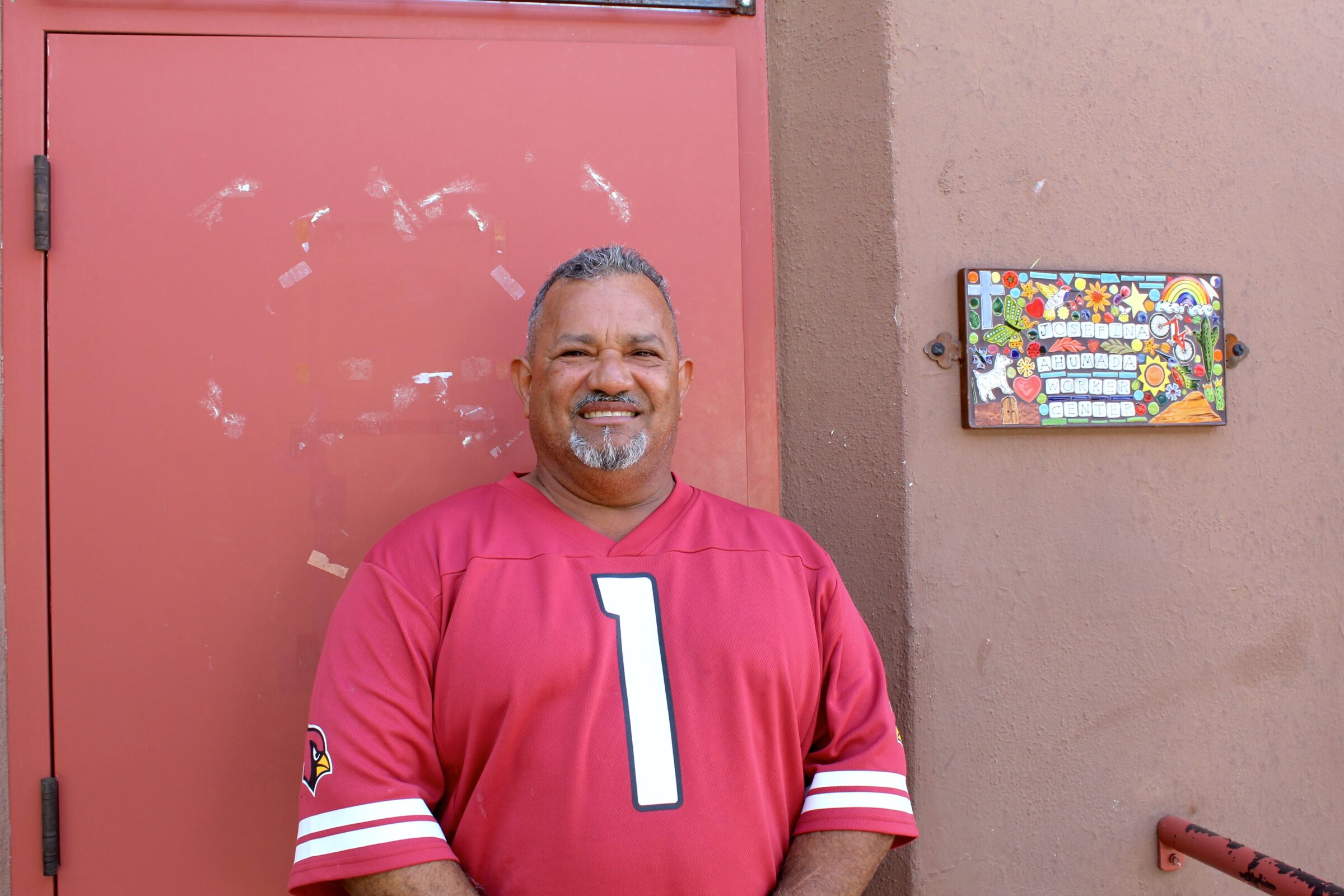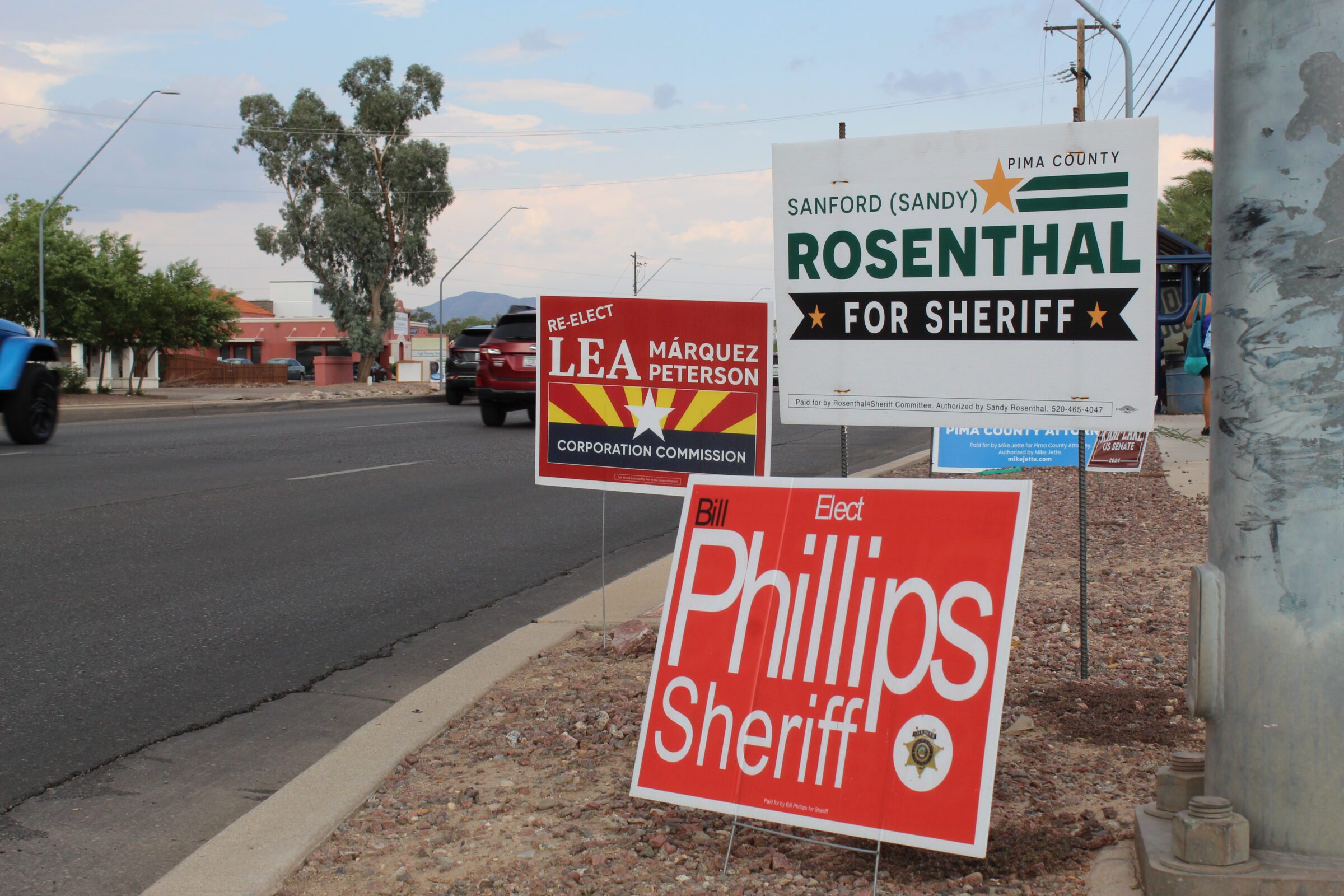In an Arizona Border County, Rifts Over How Much to Help the Feds Patrol the Border
Democrats running for sheriff in Tucson disagree on whether to ramp up local collaboration with federal immigration enforcement, years after activists got a program canceled.
| July 25, 2024

Update (July 31): Nanos won the Democratic primary for sheriff on Tuesday, July 30.
All Arizonans this fall could decide whether to boost the role of local police in border enforcement, as Republicans placed a measure on the statewide ballot that would empower cops to arrest people suspected of being undocumented. But the issue is also playing out locally this year, highlighting critical disagreements among law enforcement in Arizona over just how much to collaborate with federal border police.
A local election next week will help decide if the leadership of a populous border county will have any appetite to increase partnerships with the border patrol in coming years.
Operation Stonegarden, a federal grant program that gives local police the funds and equipment to patrol the border region for immigration enforcement, has become a dividing line among candidates in this year’s race for sheriff of Pima County, home to Tucson. While the incumbent sheriff, Chris Nanos, says he agrees with the county’s decision to leave the program several years ago, his opponent in the July 30 Democratic primary wants Pima County to rejoin Operation Stonegarden.
Sandy Rosenthal, a former deputy with the Pima sheriff’s office and Nanos’ challenger next week, has sharply criticized the sheriff for leaving Stonegarden money on the table amid budget and staff shortages that have contributed to poor conditions at the jail. At a June candidate forum, Rosenthal endorsed the federal border partnership as a way to stem the flow of fentanyl into the community.
“It allows us to get more deputies out in the farther reaches of Pima County,” Rosenthal said during last month’s forum. “When you give up an area, when you give up a responsibility, bad things happen. The cartels, they enjoy what’s happening now. They don’t have to worry about any deputy sheriff being out along the border. There’s no coverage whatsoever.” Rosenthal did not respond to requests for comment from Bolts.
Nanos told Bolts that local law enforcement should not take up border enforcement duties since securing the border is primarily a federal function—a position the U.S. Supreme Court has repeatedly affirmed. Nanos also said the county didn’t benefit from the Stonegarden patrols, which typically occurred in remote areas that have little crime: The sheriff said that less than 1 percent of emergency calls his office receives come from the area along the border. Cartels, Nanos said, practically never smuggle fentanyl through the open desert, opting instead to use vehicles crossing ports of entry.
“That grant didn’t benefit the community at all. It benefitted border patrol because it gave them boots on the ground,” Nanos told Bolts. Officers on Stonegarden assignments, Nanos said, “didn’t work for the sheriff. They worked for border patrol. They were on border patrol radio. They answered to border patrol supervisors.”
Public officials often point to the border as a proxy for the everyday issues that Pima residents face, especially the drug crisis and crime, Nanos said. Stoked by voices from the far right on the national stage, residents across the political spectrum in Southern Arizona have echoed fears that migrants are responsible for a flood of fentanyl pouring across the Mexican border that has resulted in countless overdoses and deaths.
But extensive research indicates that immigrants commit less crime than U.S.-born people and that there’s no correlation between undocumented people and rising crime. As for drug smuggling, fentanyl rarely moves into the country through the open desert and is almost always smuggled in through legal ports of entry, with U.S. citizens accounting for 89 percent of convicted fentanyl traffickers, according to a report from the U.S. Sentencing Commission.
Adelita Grijalva, the Democratic chair of Pima County’s Board of Supervisors who opposes Stonegarden grants, told Bolts she worries about what their return would mean for her constituents. More than a third of people in this county of more than one million residents are Hispanic, according to the 2020 census.
“People of color, specifically Latinos, are going to be targeted because of the way we look,” Grijalva said. “There’s an assumption people shouldn’t be in our communities because of what we look like—what my family looks like—that we may or may not be citizens. So having our Pima County Sheriff pulling people over based on that suspicion is a huge concern.”
As immigration crackdowns escalated at both the state and federal levels, a decades-long immigrant rights’ movement in Arizona pressured local governments to end participation in the Stonegarden program.
In 2010, then-Governor Jan Brewer signed what became known as the state’s “show me your papers” law. Under the law, police could arrest and charge immigrants with a state crime if they were not carrying their immigration documents. Critics said the law, portions of which were eventually struck down, gave local police free reign to target people based on their ethnicity and would lead to racial profiling.
The 2010 law made Arizona unlivable for many in the state without papers who struggled to find necessities like work, housing and medical care, said Tony Pineda, a staff member of the Southside Worker Center. The center formed in 2006 to give day laborers a safe place to find employment and negotiate wages after jobseekers ran into problems with border patrol and local police. But even with the center’s help getting legal support, housing assistance and other essentials, immigrant families in the area struggled under what was the country’s strictest immigration policy at the time, Pineda said.
“It was something we suffered a lot from. At that time, I was undocumented as well. There was a big impact on the city for immigrants, and I saw it harm the members of the Worker Center,” Pineda said.
This organizing against Brewer’s signature law laid the groundwork for the fights to come. Neighborhood groups across Tucson and immigrant rights organizations became more active and built stronger connections with each other to unite against the restrictions, Pineda said, eventually pushing the city of Tucson to sue the state to block the law. The Southside Worker Center later joined groups including the American Civil Liberties Union and the National Day Laborer Organizing Network to challenge the “show me your papers” law in court.
Another massive mobilization in support of immigrant rights came around 2018 after the federal government adopted a zero-tolerance policy that separated thousands of migrant children from their parents at the border and incarcerated them in detention centers widely condemned for abusive conditions. Many in Pima County found the hardline border policies inhumane and cruel, Pineda said. As images of children locked in cages and stories of newborns ripped from their mothers’ arms spread across social media, voices grew louder against the family separations and the anti-immigrant sentiment at the policy’s root.
“It had a big impact on the community, even for people who are already established here, regardless of legal status,” Pineda said. “They also suffer because they have families too. It was something that took root in the entire city, and across Pima County.”

As the unfolding family separation crisis became the face of federal immigration policy, attitudes in Pima County toward border authorities soured, said Isabel Garcia, co-founder of the Coalición de Derechos Humanos and the former Pima County Legal Defender. This heightened pressure on elected officials to separate their local police forces from border patrol missions, Garcia said.
“We were protesting all over. We had massive demonstrations in front of the federal courthouse. Everybody came out about the children,” Garcia said. “We were very inspired by the unity, more than anything. So they couldn’t lie to us anymore. We knew exactly what it entailed—that these police officers, when they checked in, had to become border patrol agents and follow the commands of border patrol.”
Garcia said that the Stonegarden program had a chilling effect on public trust in law enforcement, where people stopped reporting crimes and calling 911 for help out of fear that they or their loved ones would be arrested and deported.
These are complaints that immigrants’ rights activists have voiced against local partnerships with federal immigration enforcement elsewhere in the country. In neighboring Maricopa County, Sheriff Joe Arpaio reshaped the department to act as an extension of immigration agencies during his long tenure from 1993 to 2017. His actions spurred a legal battle in 2007 that eventually led to a federal court ruling that the sheriff’s office had engaged in racial profiling and ordering the department to reform the discriminatory practices.
Critics of the Stonegarden program in Pima County say it did little to benefit public safety and resulted in thousands of people being needlessly detained, interrogated and harassed by local cops over immigration status—especially Latino drivers.
“It was all just to check them for Border Patrol. We wound up with people getting arrested and deported at that point,” Garcia said. “Imagine all of these stops. If I get stopped, I’m still scared, and I’m a lawyer and a citizen. There is no justice for us anymore.”
In 2018, over objections from the Republican sheriff at the time, the Pima County Board of Supervisors voted to end the county’s participation in Operation Stonegarden, which had given the county around $16 million over the prior 12 years. Board members who voted to not apply for the grants expressed concerns that the program banned using the grant funds for humanitarian relief and that targeting immigrants could chill people’s trust in local police.
Tucson, the county’s largest city, also withdrew its police department from the Stonegarden program in 2020 after federal officials denied the city’s requests to spend some of the grant money on humanitarian aid for migrants seeking asylum. The city’s police chief at the time told the Arizona Daily Star that the feds’ denial “really seemed like the end of the line” for the program, which the chief said was “not a great fit for the work we were doing.” On the other hand, the neighboring town of Marana still participates in Operation Stonegarden. Marana Police uses the funds to assign patrols in rural areas thought to be routes for smugglers and drug cartels, a police spokesperson said.
While the members of the Pima County Board of Supervisors have changed since initially rejecting the federal money, there isn’t currently enough support to sign off on the Operation Stonegarden program even if the winner of the sheriff’s race applied for the grants, said Grijalva, the board chair. Democrats currently have a four-to-one majority on the board.
Still, all seats on the board are up for election this year, so the board’s position may change depending on the outcomes in November. A new sheriff who makes it a mission to ramp up immigration enforcement could also put more pressure on other county officials, especially if it coincides with changeover in the federal administration.

The winner of next week’s Democratic primary between Nanos and Rosenthal will face one of three GOP candidates—Bill Phillips, Heather Lappin, Terry Frederick—in November. All three Republicans have expressed support for harsher practices on immigration. The Democratic nominee will be favored in the general election in this county that typically votes blue, but Republicans have had local success—including winning the sheriff’s office as recently as 2016.
Groups are also already gearing up for a fight to convince voters to reject Proposition 314, a measure that was put on the November ballot by Republican lawmakers that would empower state and local law enforcement to arrest people suspected of being undocumented immigrants. (Opponents of the measure are trying to knock the measure off the ballot, and litigation is ongoing as of publication.) Both Nanos and Rosenthal oppose the ballot measure.
Grijalva is confident that, in Pima County at least, voters will want to keep in place officials who oppose scaling up enforcement.
“The positions on Stonegarden, for a lot of people, that’s been their deciding factor on who they are going to vote for,” she told Bolts. “Pima county continues to be a place that is humanitarian, that wants justice, and wants our community to be safe.”
Correction (July 26): An earlier version of this story misstated that Grijalva has endorsed Nanos’ reelection bid; she has not.
Sign up and stay up-to-date
Support us
Bolts is a non-profit newsroom that relies on donations, and it takes resources to produce this work. If you appreciate our value, become a monthly donor or make a contribution.

